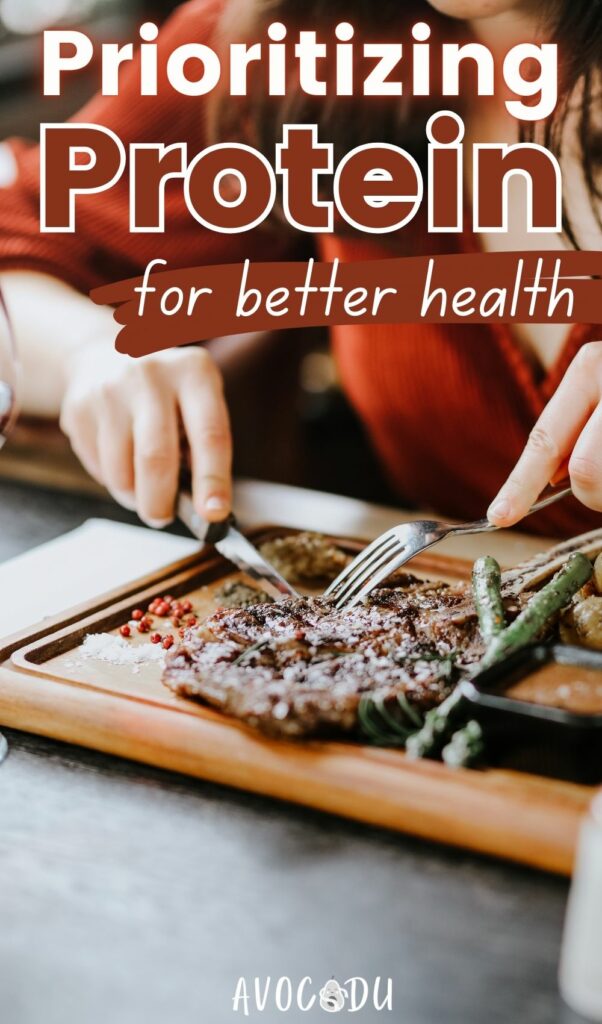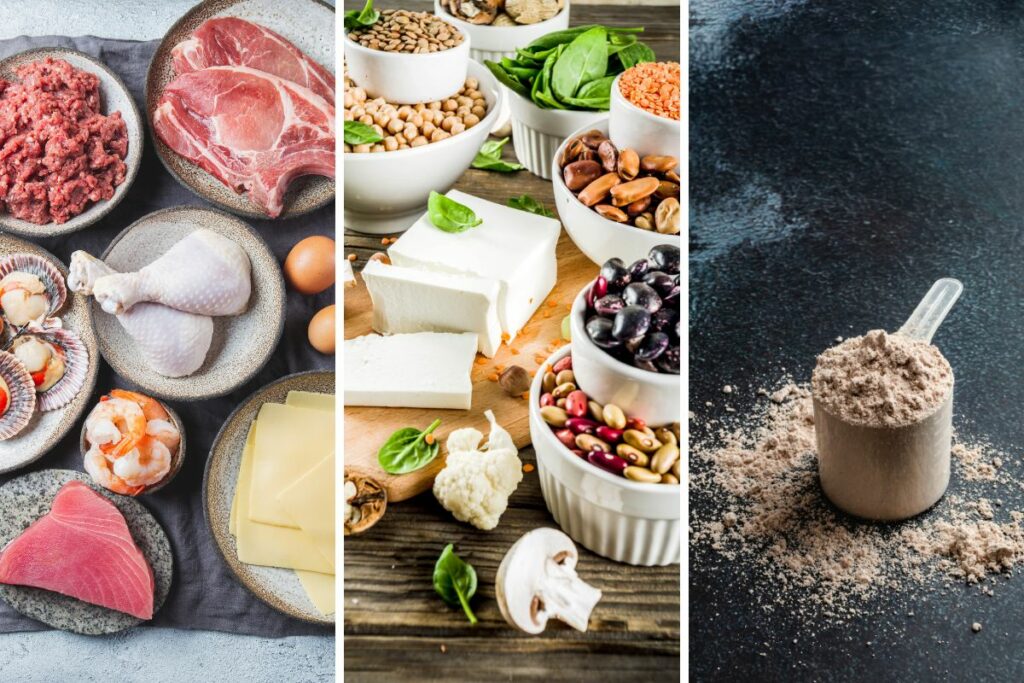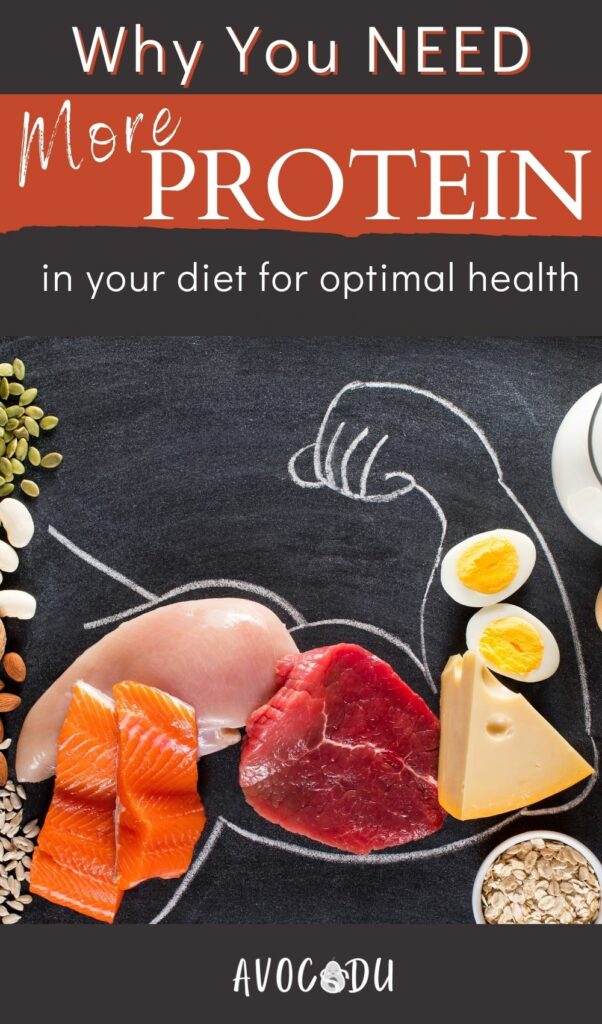Why You NEED to Prioritize Protein in Your Diet
Feeling low on energy lately? Struggling to build muscle, or constantly battling cravings? If so, it’s time you prioritize protein in your diet.
Often overshadowed by the latest superfood or fad diet, protein quietly plays a massive role in keeping your body running smoothly.
It’s the building block your muscles crave, the secret to staying full, and a major player in maintaining overall health.
Once you start prioritizing protein, you might find you have more energy, better muscle tone, and fewer cravings throughout the day.
Let’s talk about why it’s so important, how to tell if you’re not getting enough, and simple ways to add more to your meals.

This post may contain affiliate links, which helps keep this content free. Please read our disclosure for more info.
Why Protein is Important
Protein isn’t just for bodybuilders or athletes; it’s a nutrient that everyone needs, especially women, because it supports nearly every function in the body.
When you eat protein, it breaks down into amino acids, which your body uses to repair tissues, produce enzymes and hormones, and maintain essential functions.
In other words, it’s like the building material your body relies on to keep things working smoothly. Without enough, you might start to notice a few things slipping—like feeling tired, weak, or just not at your best.
Protein’s benefits go beyond muscle repair. It’s vital for producing enzymes that help digest your food and hormones that regulate everything from mood to metabolism.
Plus, it plays a big role in maintaining healthy skin, hair, and nails. If you’re dealing with brittle nails, thinning hair, or skin that lacks its usual glow, your protein intake might be lower than your body needs.
Another key role of protein is supporting the immune system. The antibodies that help fight off infections are made from proteins, so without enough, your body might have a harder time staying healthy. Protein also helps transport nutrients, provides structure to cells, and aids in cellular repair.
Overall, protein is essential for keeping you strong, energized, and feeling your best. Without it, you might find yourself feeling run-down, struggling to keep up with your daily routine, or just not seeing the results you want.
Related article: The Power of Protein for Women’s Weight Loss
6 Signs You Might Not Be Getting Enough Protein

Not sure if you’re getting enough protein? It’s a common issue, especially if you’re not actively thinking about including it in your meals. When your body doesn’t have the protein it needs, it can’t perform at its best, and several signs may start to show up. Here are a few clues that your intake might be falling short:
1: Fatigue and Lack of Energy
Do you feel drained by midday, or find yourself constantly reaching for that extra cup of coffee just to keep going? Low protein could be part of the problem.
Protein is crucial for maintaining steady energy levels because it helps to regulate blood sugar and prevent energy dips.
Without enough protein, your body might struggle to keep up, leaving you feeling sluggish and tired throughout the day.
2: Difficulty Building or Maintaining Muscle
Ever hit the gym regularly but still struggle to see progress? Protein is essential for muscle repair and growth, so if your muscles aren’t getting the building blocks they need, you might find it hard to build strength or maintain your current muscle mass.
This is especially true if you’re trying to tone up or maintain muscle as you age. Increasing your protein intake could help you see better results from your workouts.
3: Hair Loss, Brittle Nails, and Skin Issues
Noticing more hair in the shower drain, or that your nails are breaking more often? Protein is a major component of your hair, skin, and nails, so signs of a deficiency can easily show up here.
Without enough protein, your body may prioritize using it for more critical functions, like repairing muscles or producing hormones, leaving your hair, skin, and nails without what they need to stay healthy.
Dull skin, thinning hair, and weak, brittle nails could all be signs that it’s time to eat more protein.
4: Cravings, Especially for Carbs and Sweets
Can’t seem to stop snacking, especially on sweets or carb-heavy foods? Protein plays a key role in stabilizing blood sugar levels.
When your protein intake is low, blood sugar levels can swing more drastically, leading to more intense cravings.
Eating more protein can help keep your blood sugar stable, reduce those midday sugar cravings, and help you feel more satisfied after meals.
5: Slow Recovery After Workouts or Injuries
If it feels like you’re sore for days after a workout or if cuts and scrapes seem to take forever to heal, low protein might be to blame.
Protein is crucial for repairing tissues, so without enough, your body may struggle to recover from physical exertion or even minor injuries.
6: Mood Changes and Trouble Concentrating
Protein isn’t just about physical health; it can impact your mental state too. Amino acids from protein are used to make neurotransmitters, which help regulate your mood and brain function.
If you’re not getting enough protein, you might find yourself feeling more irritable, anxious, or just having a harder time focusing than usual.
If any of these signs sound familiar, it might be time to reassess your protein intake. A few simple adjustments could make a big difference in how you feel and function every day.
How Much Protein Do You Really Need?

The amount of protein you need isn’t one-size-fits-all. It can depend on your age, activity level, overall health, and specific goals.
General recommendations suggest that adults should aim for about 0.8 grams of protein per kilogram of body weight (which translates to about 0.36 grams per pound).
However, this is a baseline amount meant to prevent deficiencies, not necessarily to optimize health, muscle maintenance, or fitness performance.
Active people will need more protein than this simple baseline to feel your absolute best.
If you’re active, trying to build muscle, or over 50, your protein needs are likely higher. Here’s a more detailed breakdown:
- Sedentary Adults: For those who aren’t particularly active, the standard recommendation is 0.8 grams per kilogram (0.36 grams per pound) of body weight. For example, if you weigh 150 pounds, you’d need a minimum of 54 grams of protein per day.
- Active Individuals and Those Trying to Build Muscle: If you exercise regularly, especially with strength training, your body needs more protein to repair and build muscle. Recommendations range from 1.2 to 2 grams per kilogram (0.54 to 0.91 grams per pound) of body weight. For example, a 150-pound person might need anywhere from 81 to 137 grams of protein per day.
- Older Adults: As we age, muscle loss can become a concern, making protein even more important. Older adults may benefit from aiming for 1.2 to 1.5 grams per kilogram (0.54 to 0.68 grams per pound). This can help preserve muscle mass, which is crucial for maintaining strength, mobility, and overall health.
- Athletes or Those Engaging in High-Intensity Workouts: Athletes or those who engage in intense physical activity might require 1.6 to 2.2 grams per kilogram (0.73 to 1 gram per pound). For instance, a 150-pound athlete may need 110 to 150 grams of protein daily to support muscle recovery and energy needs.
Consider Your Activity Level and Goals
To figure out the right amount for you, start by considering your daily activities. If your workouts are regular and intense (think strength training, running, or high-intensity interval training), aim for the higher end of the spectrum.
Even if you’re just trying to maintain your current muscle mass, it’s a good idea to keep your protein intake a bit higher than the baseline recommendation.
This will help ensure your muscles get the fuel they need to stay strong, and you won’t risk losing muscle mass as you get older.
Your goals matter, too. Are you trying to lose weight, build muscle, or just stay fit? Protein can be a helpful tool for all three.
For weight loss, more protein can help curb cravings and keep you full longer, making it easier to stick to a calorie deficit.
For muscle gain, it’s essential to eat enough protein to support muscle repair and growth after your workouts.
A Note on Plant-Based Diets
If you follow a plant-based diet, you might need to be a bit more strategic about your protein sources.
It’s entirely possible to get enough protein from plants, but it often requires a combination of foods to ensure you’re getting all essential amino acids.
Consider options like lentils, chickpeas, quinoa, tofu, tempeh, and a variety of nuts and seeds. Plant-based protein powders can also be a convenient way to boost your intake, especially after a workout.
Understanding your protein needs and adjusting your intake based on your lifestyle can make a significant difference in how you feel and function.
Start by calculating what’s right for you, and then try to incorporate protein-rich foods into each meal. It doesn’t have to be complicated, just a few simple adjustments can set you up for better health and stronger muscles.
Related article: 14 Plant-Based Protein Sources for a Healthy Diet
Common Sources of Protein

Boosting your protein intake doesn’t have to mean overhauling your entire diet. It’s all about finding versatile, tasty options that fit your lifestyle and preferences. Here are some easy ways to add more protein to your meals:
Animal-Based Options: If you eat animal products, there are plenty of protein-rich choices to consider. Chicken, beef, and fish are classic sources that can be prepared in countless ways, whether grilled, baked, or added to salads and stir-fries.
Eggs are another fantastic option; they’re affordable, easy to cook, and can be eaten any time of the day.
Dairy products like Greek yogurt, cottage cheese, and cheese not only add protein but also bring in calcium and other nutrients. For a quick snack, try hard-boiled eggs, string cheese, or a cup of yogurt.
Plant-Based Options: For those who prefer plant-based proteins, there’s no shortage of delicious choices. Beans, lentils, and chickpeas are high in protein and can be added to soups, stews, salads, and even burgers.
Tofu and tempeh are versatile options that absorb flavors well, making them great for stir-fries, curries, and marinades.
Quinoa is another excellent source—it’s not only high in protein but also a complete protein, meaning it contains all essential amino acids.
Don’t forget about nuts, seeds, and nut butters; they make great snacks and can be easily added to smoothies, oatmeal, or salads for an extra protein boost.
Mixing Sources for a Complete Amino Acid Profile: If you follow a plant-based diet, it’s a good idea to mix different types of plant proteins to ensure you’re getting a complete range of amino acids.
While animal-based proteins are typically complete, some plant-based proteins may lack certain amino acids.
By combining foods—like rice and beans, hummus with whole-grain pita, or peanut butter on whole-grain toast—you can create meals that provide a balanced amino acid profile.
Convenient Protein Supplements: If you’re struggling to get enough protein through whole foods alone, supplements like protein powders can be a convenient addition.
They come in various forms, including whey, casein, and plant-based options like pea, hemp, or soy protein.
You can blend them into smoothies, mix them with water, or even add a scoop to your oatmeal for a quick protein boost.
Related article: 10 Delicious Whey Protein Recipes
There’s no single “right” way to get your protein. Whether you prefer meat, dairy, or plant-based options, there are plenty of ways to mix and match to meet your needs.
Focus on adding a variety of protein sources to your meals, and you’ll be well on your way to a balanced and satisfying diet.
How to Effectively Prioritize Protein in Your Meals
Ready to add more protein to your day? Start by making small changes:
- Start your day with a protein-rich breakfast: Eggs, Greek yogurt, or a protein smoothie can set you up for a productive day.
- Include a source of protein in every meal: This could be as simple as adding beans to your salad, chicken to your pasta, or tofu to your stir-fry.
- Consider snacks that are high in protein: Nuts, seeds, cottage cheese, or jerky are convenient options for when you’re on the go.
- Meal prepping: Plan your meals ahead of time to ensure you’re getting enough protein throughout the day.
Related article: 10 Yummy High Protein, Low Carb Snacks
Addressing Common Concerns About High-Protein Diets
There’s a lot of misinformation out there about protein, so let’s clear up a couple of common concerns:
- Myth: “Too much protein is bad for your kidneys.” This is only a concern for individuals with pre-existing kidney issues. For healthy people, a higher protein intake is generally safe.
- Myth: “You can’t get enough protein on a plant-based diet.” With a bit of planning, it’s entirely possible. Focus on a variety of plant proteins, and you’ll cover all your bases.
Ready to Prioritize Protein? It’s Time to Take Action!
If protein hasn’t been a focus in your diet, now is the perfect time to start giving it the attention it deserves. By making protein a priority, you can support muscle health, manage your weight, and maintain steady energy throughout the day.
Even small changes—like adding a protein source to each meal or opting for high-protein snacks—can have a big impact on how you feel and function.
Looking to make a bigger commitment to your health and see real results? Check out our 21-Day Fat Loss Challenge.
This program is designed to help you reset your habits, lose weight, and build a sustainable approach to healthy eating, all while making sure you get the nutrients you need, including plenty of protein.
If you’re ready to kickstart your health journey, this challenge can guide you step by step toward your goals.

